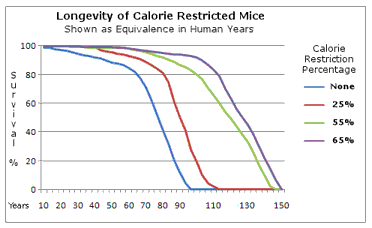Eating Less
Most of us have heard the concept expressed many times that we should eat less... but, unfortunately, taste buds rule over our brain buds most of the time, and so we eat more than is needful.
The ways to implement this age-old wisdom include:
- Eating primarily nutrient and fiber dense foods.
- Discontinuing eating while still hungry or eating slowly. The feeling of hunger takes a while to be turned off, hence the reason for this advice.
- Discontinuing eating three to four hours before retiring to bed.
- Periodic fasting for longer periods of time.
Science has proven that regularly eating half as much food (as one would instinctively eat) can add 50 to 60 percent to one’s life span
Studies with animals show that eating half as much food can add 50 to 60 percent to maximum life span, and also can help prevent diseases and help increase mental capacities (Dr. Gabriel Cousins, Dr. Derek Huffman).
 Studies, such as the one shown to the right, were done with animals and organisms that have a short life span, including flies, worms, mice and monkeys. Studies, such as the one shown to the right, were done with animals and organisms that have a short life span, including flies, worms, mice and monkeys.
In these studies, when nutritious food was unrestricted, the maximum life span equated to about 95 years of age for humans with a median of 75 years of age. By decreasing food supply, about a 1% increase in maximum and median life span was observed for each 1% decrease in food eaten. This continued up to about a 65% decrease in food, beyond which no life extension benefits occurred (Ian Goddard).
Very interestingly, these studies have shown that allowing instincts to guide the amount of food one eats does not give the best results. So, one is going to have to override instincts with deliberate choice.
Frequent Fasting is also Longevity-Expanding
Some of these studies demonstrated that fasting every other day, and eating a full amount of food on the non-fasting days, produced the same longevity, disease-avoiding and brain-enhancing benefits as did continuously under eating.
Some of the authors of these studies concluded that converting food into energy takes a toll on the body (wears it out), and especially in regard to the cellular mitochondria. So, processing fewer calories is desirable to make the body last longer.
Others believe that fasting puts the body into an enhanced mitochondrial repair mode. They believe that it is having more of these “enhanced cellular repair sessions” (that come only during fasting) that produces the longevity gain.
A final group differs from both of the above and attributes the benefits of fasting to having very low leptin levels which turns back on a gene instructing DNA repair to occur, which gene turns off when leptin levels are high.
Regardless of why, it is a fact that under-eating calories, while eating sufficient nutrients can, in controlled laboratory experiments, double average life span.
Please note that if we undertake to eat less by any of the above means:
Only calories should be restricted! Not eating sufficient minerals, amino acids, fatty acids, etc. would be unwise.
Sage Advice for Living Longer By Eating Less
Eating smart is a telltale sign of today’s intelligent men and women.
Dr. William Kellas says it so simply, “We ought to half up on carbs and double up on nutrients.”
So, remember the advice of numerous nutrition advisers who say things like
- “Stop eating before you are full”.
- “Leave the table hungry.”
- “Eat very slowly so that the food you are eating reaches the bloodstream and turns off your appetite control mechanisms before you over eat
The common denominator in each of the above is establishing the habit of eating less which goes contrary to our nature.
Small, Frequent Meals
People who are subject to sugar fluctuations (typically diabetics or pre-diabetics, or persons with considerable stored fat on their bodies) will do best if they eat small meals every two to three hours since this helps prevent spikes in blood sugar. Increased blood sugar has been shown to be a major factor in mitochondrial aging, cardiovascular disease and in fat deposition.
Enhanced Nighttime Cellular Repair
We ought to stop eating three hours prior to sleeping since this creates a fasting atmosphere which triggers more efficient cellular and mitochondrial repair work during sleeping time.
Cited Research and Futher Study References:
Dr. Gabriel Cousins has done research showing that maximum lifespan is increasing by decreasing calorie intake. Read more at http://www.creationsmagazine.com/articles/C105/Cousens.html
Dr. Derek Huffman has also done research that shows that although exercise does prevent an early death, it does not increase maximum life span, which under eating does. Read more at http://www.medindia.net/news/Eating-Less-Extends-Life-Span-36725-1.htm
Only one non-transgenic intervention has been reliably shown to increase maximum life span and that is calorie restriction. Read more at: http://iangoddard.net/cr.htm
Back to Top
|